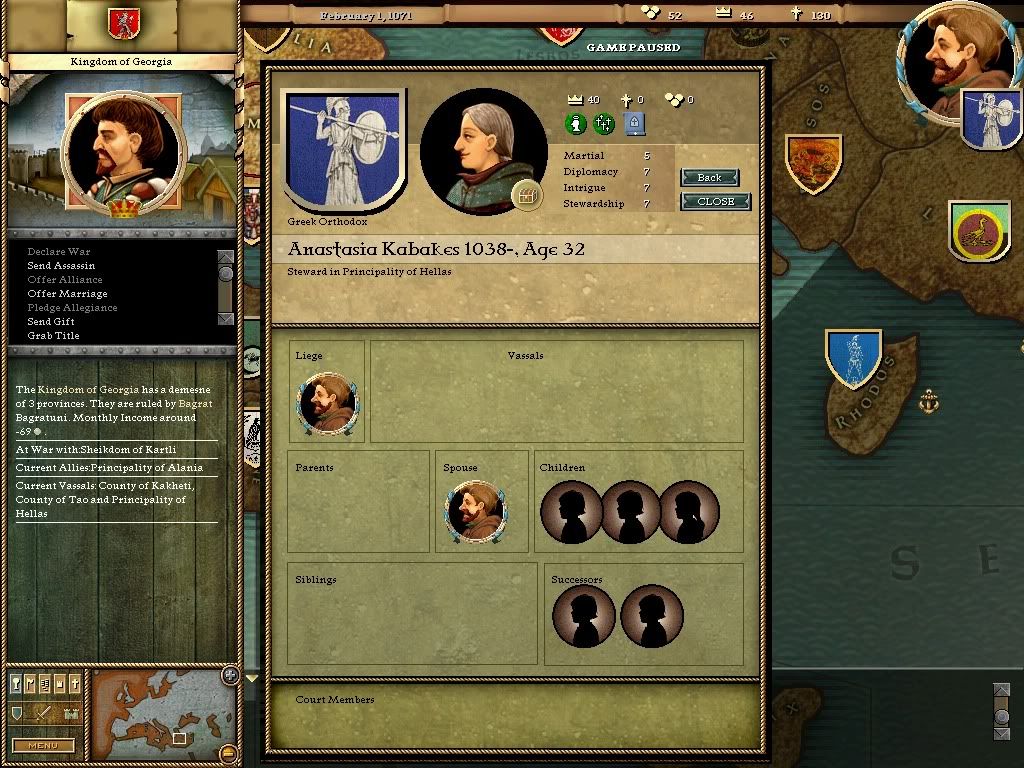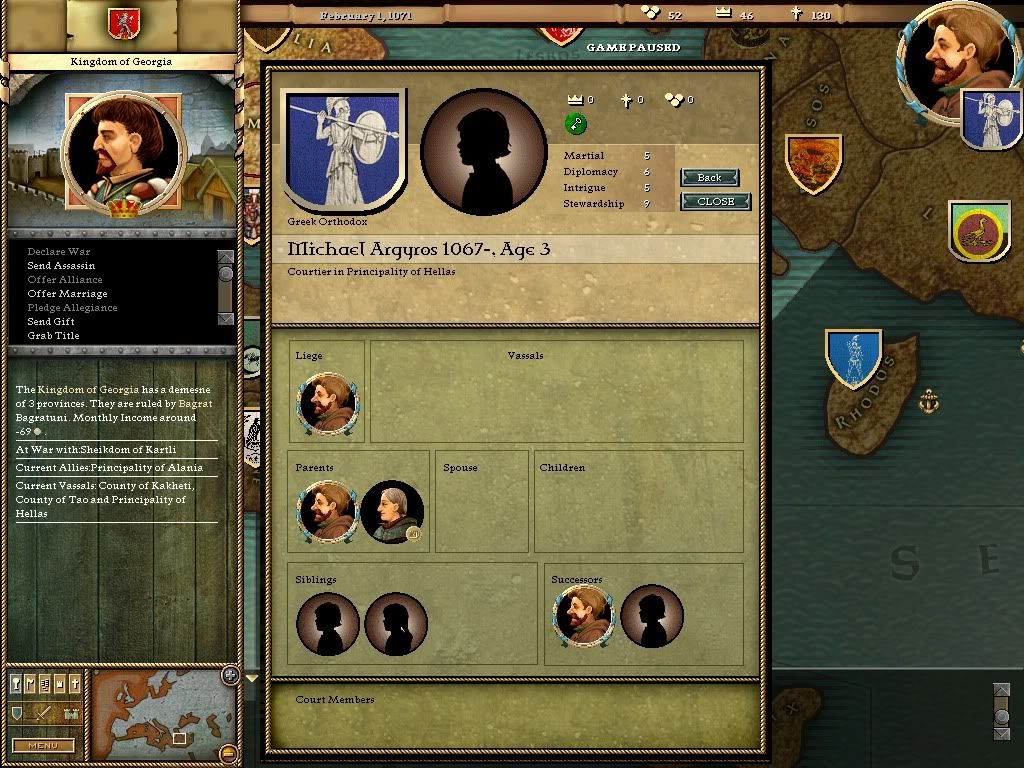The widespread use of operational nuclear weapons has twisted conventional war strategy beyond its breaking point. On the New Earth colony, total war has not lead to the much predicted scenario of Armageddon and global Nuclear Winter, because of the peculiar circumstances to be found there. Instead, a protracted campaign of use of tactical nuclear weapons at sea and in the cities and battlefields, has caused a slow decline amongst all the major powers, who struggle to keep up with the military production needed to stay in the war.
The following schematic gives a visual overview of the New Era world political map and major players:
Long range strategic nuclear weapons are no longer effective tools of war. Nuclear defense systems have locked down the orbital launches, and coastal systems are almost as effective against submarine launched ICBMs.
If New Earth had Earth's uranium and plutonium reserves and Earth's production capacity, it would be a relatively simple matter to flood any system's defensive capacity and wipe out New Earth entirely. Luckily, that is not the case. The war has made finding laborers difficult, and the rioting, radiation sicknesses and oppressive societies make controlling workers an important and intensive job.
Operational nukes can be launched from land sources, but increasingly these weapons are being hosted in submarine platforms, except that now the subs have to get in pretty close to their targets, inside the range of a carrier's air wing. Of course, carriers have not been fielded in significant numbers for decades. Air power is still used in many places, but not at sea. The carriers are too expensive to field when they can be wiped out by a nuke or two.
175 years ago, the New Earth project reached the planet previously known as Habitable Sequence Catalog #84. This planet was identified as the nearest likely habitable planet to our solar system. A multilateral and peaceful effort was put together, with help and support from twelve of the largest nations on Earth. Most significantly, China put aside its differences with a number of western countries and put its support by the project. Also, Russia, France, Germany, England, the USA, Korea, Japan and Iran supported the project. There were some other smaller countries that also contributed along the way.
It was a truly monumentally difficult project, but the group set a goal of launching a successful long term habitation module with the expectation of at least a 90% chance of surviving the trip to #84 by the year 2200. They succeeded in that goal, and reached the planet in the year 2285. According to the original charter of the New Earth program, certain passengers were given the task of settling a number of landing sites in the name of the various nations that had supported the program. These landing sites were the foundations for New China, New Germany, New USA and so on.
New Earth was strange in that there were four continents, no Antarctica (the south pole was just ice, like the north ), and the four continents filled four compass points from the oceans between them. One of the oceans between the east and the west was smaller than the other, so it became natural for the center of that ocean to be seen as the center of the world. You could go west by heading through the narrower inner ocean, or by taking the longer journey east, thus reaching the two sides of the south and north eastern continents.
The north and south continents on both sides of the world were close together at some points along their coast lines, while the east and west were separated, both philosophically and physically. Perhaps it is natural that the war was split by east and west. There was only one exception to the geographical rule: Iran, which resided on the northeast continent, joined the Chinese coalition and thus was considered a western hemisphere power.
The first fighting in the "New World War" took place at sea, with conventional weapons, and naval fleets from Earth's past. New Earth's industries were not yet capable of producing the most advanced ships from home. These first battles looked like something out of World War I, as battleships and cruisers duked it out on the high seas. Unfortunately, the use of ICBMs to take out fleets ended all that, and many ships were in the exchange of nukes.
After the naval forces on both sides of the war were largely destroyed, the war shifted into its next phase without a clear winner in the naval conflict.
With the loss of many ships on both sides, the Nuclear war era began in earnest. Strategic defense nets were not yet in place, but luckily, uranium was rare on the planet. Russia launched more ICBMs in the Nuclear era than any other country, and set back much of the NATO powers for years. The capitals of many nations were hit, and eventually the NATO powers hit back, attacking New Moscow and a few other Russian cities.
But Russia was ahead in strategic defense, and it had a period of five years where it's strategic defense grid was in place, but the Eastern powers did not have their defenses in place. But that defense gap did get closed, and the nuclear crisis accelerated the development of formal alliances. And both sides worked feverishly on their defenses, leading to a short period of relative quiet in the war.
Calling upon memories of old Earth, the powers in the eastern hemisphere declared that they were the New Earth NATO. France, Germany, Japan, Italy, the USA and England all agreed to create NATO. Iran declined to join, and instead joined the other bloc.
Russia, China, Korea, Cambodia, Iran and Mongolia created the New Asia Pact. This began the Proxy War era. With Iran's intent to join the NAP made clear, the New Earth NATO moved swiftly, and Italy mobilized for the first fighting on land of New Earth's short history. At first supplying merely war material, soon many powers were deploying their forces in the Northeast.
The Proxy war in Iran saw a lot of fighting, and advances and retreats on both sides. When the war began, it looked like Iran was going to take over Italy, but things started to go the other way, as Italy mobilized its reserves.
On both sides of the battle lines, air transports brought in troops daily from America, from Russia, from France. The airlift operations were extensive, but eventually not considered enough. Sea transport began to take over for the emergency airlifts once it became clear that the war would not end in the time it took to bring troops by sea.
America had it easy on the sea lines, being just to the south, on the Northeastern tip of the main NATO continent. On the other hand, America was constrained by their limited manpower, but of what forces they could send, they did. The sea lines were filled with GIs and Marines, tanks and mobile artillery, mechanized infantry and anti tank vehicles. New Era's infrastructure was advancing but the war resembled World War II technologies on the ground.
Most research and development was focussed on the navy, the nuclear weapons programs and the air forces. Jet fighters joined in battles predominated by world war II style tanks. However, this was one in the early phases of the proxy war. Before too long, mechanized infantry replaced the ground troop, and tanks improved drastically.
The proxy war saw the first use of what we now call operational nuclear weapons. Like tactical nukes, but better! Less detectable, more focussed. Advanced technologies allowed a nuclear weapon with less fissionable material and thus a lesser yield, which was key to keeping your own fleet or your own army safe. With a smaller but still good enough blast, spotting could be done at an operational scale of battle, and the minimum safe distance was much closer than with the old tactical nuke. This was now a tool in the general's toolkit, but few of them were available. Whenever they were available, they were extremely effective in destroying the enemy's order of battle.
Any organized concept of ground war before that moment in time was dashed into pieces with the development of the operational nuke. Dispersion of force became the philosophy of the day. Unfortunately, highly dispersed militaries are difficult to control, and difficult to achieve anything with. So this philosophy didn't stick.
The proxy war ended because it was not going anywhere for either side. Whenever a significant force was assembled to take on a city, it was nuked into oblivion. By the end of the war, neither side would come close to an enemy city, for fear of being nuked. The silos needed for launching operational nukes could be built away from the cities, but only if a team of engineers could operate for months unhindered. That was not the case. Early attempts failed, and both sides built their silos in cities instead, and a few began to toy with the idea of retrofitting submarines for operational nukes. By the end of the war, this was possible, but neither side had invested in the idea, because nukes were in very short supply, and they were needed on land.
The cease fire allowed both sides to study radiation and nuclear sciences extensively. A vast cleanup effort began on both sides of the Iran - Italy border. Dirt was dug up and buildings were destroyed in the devastated areas, and these materials were moved to isolated unsettled areas, then fresh dirt was trucked in.
Both sides also focussed on recovering from the war and rebuilding their exhausted armies, navies and air forces. War would come again, it was a foregone conclusion, because neither side tried to cooperate or pursue openness with the other. They remained separated from one another. Within the two alliances, there was much discussion on the future, but ultimately, they could only speculate.
Russia, or alternatively America, were considered responsible for the war beginning again. America spotted a large Russian fleet approaching its coastlines. There were a large number of troop ships in the flotilla which entered US waters flagrantly. The US made a preemptive strike on the flotilla, using ICBMs against the Russian fleet.
The fleet intercepted and destroyed the ICBMs, and Russia responded by wiping out the entire American fleet with operational nukes on-board its new op-nuke subs. The Russians landed their invasion force in America, and the war began anew, this time for all the marbles.
As of the current day, January 18th 2475, the war has been ongoing for 65 years, with periods of lesser and greater intensity. Modern technologies and the fact that the war has been mostly at sea and in the air are the only real reason that the people of both factions have not overthrown their leaders. There have been invasions, but most were short lived, and in fact, the map of 2475 is largely the same as that of 65 years ago, except for the loss of Iran's old lands.
In the next post, I'll cover several invasion attempts by Russia prior to 2475, only one of which was a complete success. Later on, I'll cover two NATO invasions of Russia that the Russians barely managed to defeat. Here is a map of coastal New Russia in 2475, focusing on radiation heavy areas that have not yet undergone soil-replacement.



